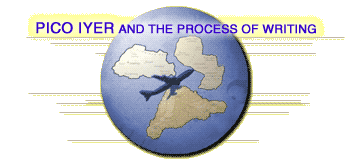 |
 |
 |
|
|||
|
Pico Iyer and the Process of Writing Visit this page on Tuesday, October 3 to listen with RealAudio.
Pico: "Without a sound, our boat set off across the lake, the darkness deepening above the dark, blue hills. The boats, with their criss-crossing lines of lanterns, looked eerie now and ghostly in the gathering dark, their white globes doubled in the rippling water. From across the river came the dull thud of an oar. The teahouses cast reflections of red and white and blue across the rippling water. And so we drifted through the night, approaching and then receding from the other silent boats. Occasionally, an open oarman's punt came across, torches burning at its prows, scattering sparks across the dark. For a moment in the torch light, the aged fishermen's faces were lit up in a flash of Rembrandt gold..." Reading those words from Pico Iyer's the Lady and the Monk, suddenly I was thousands of miles away in Kyoto, Japan. Pico takes us to Bhutan, Easter Island, Paraguay, all from his small desk in the quiet two-room Japanese apartment he shares with his girlfriend and her two teenage kids. The peace and quiet here is a far cry from the chaos when he's collecting material for his work. He's been known to travel from Damascus to London to New York to Los Angeles and back to Japan in a matter of days. Then for then months, he sits at his desk... and writes.
Pico: "If you're writing about travel, it's a natural process of breathing in and breathing out. One's impulse is to go out in the world, walk and walk and walk, absorb a lot, come back to absolute stillness to make sense of it." While he writes, Pico shuts himself off from the world, no newspapers and speaking to virtually no one. Where some travel writers try to capture a place by getting under its skin, Pico prefers to be an outsider. After 12 years, he still speaks just a smattering of Japanese, so the conversations around him stay forever impenetrable and mysterious. He's always lived, in his words, "in the cracks between cultures." Born to Indian parents, he was educated in England but traveled home to the U.S. during every school holiday.
Pico: "I do think of myself as a traveler since birth. It is a good training, at least for being at ease with foreigners, not being disconcerted by it and actually being comfortable with it. I think the challenge for people like me is domesticity and settled-ness and being part of a community, which is why I'm so happy living in a place like this where I'll always be known as an outsider." An outsider who stays fresh to the details around him. You or I might not think twice about the young Japanese waitress wearing silver nail polish on her toes, or the nonsensical sign in a hotel in Paraguay that reads "We are certainly going to be the worthy hosts that our clientele expects, without improvising, and much more." Pico thinks twice. And writes it all down, as if trying to capture the details of a dream before it's lost forever."
Pico: "For instance, we're having an interesting conversation at the moment. And if I were traveling and writing about this, I might say, "Just a minute, Deborah", and I'd literally race off into the rest room and write it all down. Literally, five minutes after you'd said it, while I could still hear your voice and remember the scene and get it exactly. Because I feel even if I were to wait until we finished this conversation we're having now, something of the immediacy and urgency would be lost." But it's a different process when he's writing fiction. His foray into novels began almost accidentally several years ago, when his notes for a non-fiction book about Cuba burned to the ground, along with his house in California.
Pico: "I called up my editor in England and I said, "By the way, I've lost all my notes." He said, "Great! Brilliant! Celebrate! That's the best thing that could have happened to you." He was getting at the sense, and I think it was true, that especially for me, if you're writing from notes, you're keeping things on a certain level of the conscious mind which is very limiting and it's preventing you from taking flight." The result was his novel Cuba and the Night. His writing, fact and fiction, is about capturing an essence. And about understanding how his unusual background effects his relationships.
Pico: "What used to be a very simple transaction which is a dialogue between a person and a society now becomes a shifting dance between a multi-cultured person, who has lots of cultures inside him, and a mongrel, multi-colored society which has lots of cultures within them. And it becomes like two kaleidoscopes bouncing off one another." As artist Paul Gaugin once said, "Pictures and writings are portraits of their authors".
|
 | American Public Media Home | Search | How to Listen ©2004 American Public Media | Terms of Use | Privacy Policy |
